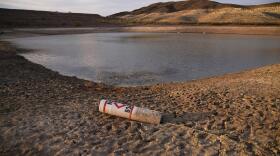-
Arizona will continue to take a hit on its Colorado River allotment next year as western states struggle to deal with dire drought conditions.
-
Arizona, California and Nevada have collectively dropped their water use to the lowest it’s been in 40 years. It comes amid a historic drought that’s put unprecedented stress on the Colorado River system.
-
The U.S. Bureau of Reclamation has finalized its guidance for protecting water levels in Lake Powell and Lake Mead.
-
The federal government indicated its support on Tuesday for a plan hammered out by the Lower Basin states to conserve water in the Colorado River over the next three years. KNAU’s Melissa Sevigny reports.
-
A new podcast called “Parched” explores the complexities of the Colorado River Basin, at a time when persistent drought has sparked difficult discussions about water. Its goal is to shine a light on solutions. KNAU’s Melissa Sevigny spoke with the podcast’s host Michael Elizabeth Sakas, a climate reporter at Colorado Public Radio.
-
Today a nonprofit environmental group named the Colorado River through Grand Canyon the nation’s most endangered waterway. KNAU’s Melissa Sevigny reports.
-
New research says many cities in the Southwest have reduced their total water use in the last two decades, despite drastic population growth. But these strides in water conservation haven’t helped the drought-stressed Colorado River. KNAU’s Melissa Sevigny spoke with the study’s author Brian Richter of Sustainable Waters.
-
The Grand Canyon won’t see a beach-building flood this fall for the fourth year in a row. KNAU’s Melissa Sevigny reports, river managers point to unprecedented low levels in Lake Powell.
-
The drought in the Southwest has bottomed out major reservoirs on the Colorado River and raised alarms among cities and farms that rely on the water. But it’s also a threat to the environment in one of the world’s most recognizable wonders: the Grand Canyon. As KNAU’s Melissa Sevigny reports, a longstanding program of artificial floods to save the canyon’s beaches now faces an uncertain future.
-
The Gila River Indian Community in central Arizona has withdrawn from an agreement that keeps more water in Lake Mead. KNAU’s Melissa Sevigny reports, the Community cites the “complete lack of progress” among the states trying to negotiate water cuts to deal with the drought.

Play Live Radio
Next Up:
0:00
0:00
Available On Air Stations










